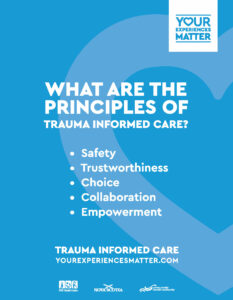Principles of Trauma Informed Care
Creating safe spaces is about acknowledging trauma, building welcoming and safe physical environments, and promoting trust and respect in our daily interactions.
Trauma Awareness
A trauma-informed approach begins with building awareness of the prevalence of trauma, how the impact of trauma can be central to one’s development and identity, the wide range of adaptations people make to cope following an experience of trauma, and the relationship of trauma with a range of physical and mental health concerns. This growing understanding of trauma has led to calls for the development of both trauma-informed care and trauma-specific services.
Safety and Trustworthiness
Creating cultures of trauma informed care means creating spaces where people feel emotionally, physically and culturally safe. Safety and trustworthiness can be established through such practices as empowering intake procedures, kind and respectful interactions, having the ability to control some aspects of the physical space, providing clear information about the programming, ensuring informed consent, creating safety plans, and demonstrating predictable expectations.
Choice and Collaboration
Creating opportunities for choice and collaboration is an important feature of trauma informed care. Prioritizing choice and collaboration leads to environments that foster respect, efficacy, agency and dignity. This means staff and clients partner in all aspects of care. It also supports community groups working together collaboratively to meet the collective needs of our community.
Strengths-Based Skill Building
Trauma informed care creates services that understand the effects of trauma, and promote skills that support self-regulation and resiliency. People learn practical skills which take their existing strengths and expertise into account. These may include such things as: raising awareness of triggers, calming, centring, staying in the present, mindfulness and other skills are seen as important not only for clients but also for staff.
Cultural and Historical Awareness
Trauma informed care recognizes that people’s trauma may be linked to culture, historical events, war, targeted violence, and/or being part of a marginalized or minority group. Services that are trauma informed need to be culturally and ethnically sensitive and safe and support healing through various forms.
Engagement
Trauma informed care recognizes the importance of actively encouraging the participation and involvement of clients/families in the design, implementation and evaluation of services. Engagement and input from clients, their peers and family members make it possible to get critical feedback to increase choices for clients. Additionally, integration of peer support can be instrumental in creating safety and choices for clients.
Developmentally-Appropriate Considerations
Using a developmentally-appropriate lens can help us understand how traumatic childhood experiences are not only common but also can have a profound impact on many different areas of functioning and development. Offering developmentally-appropriate services and settings is important in the formation of relationships.




